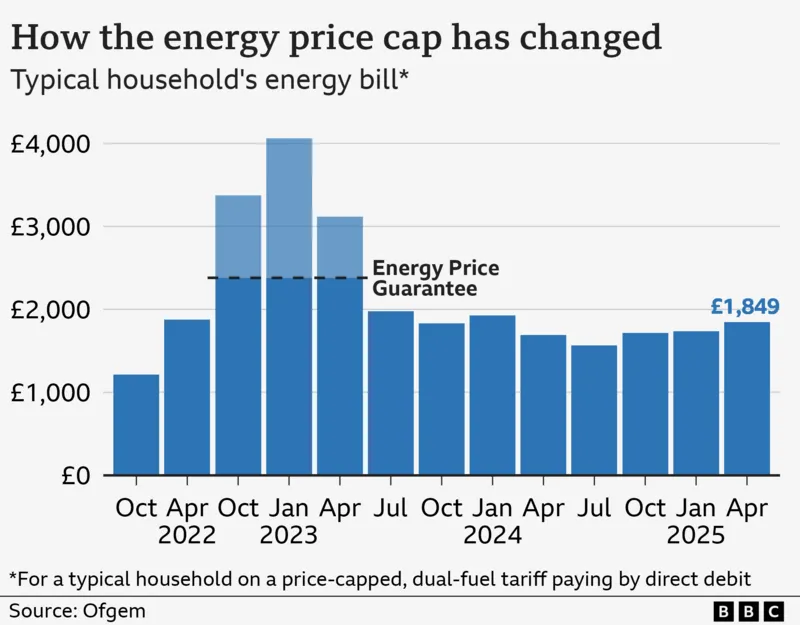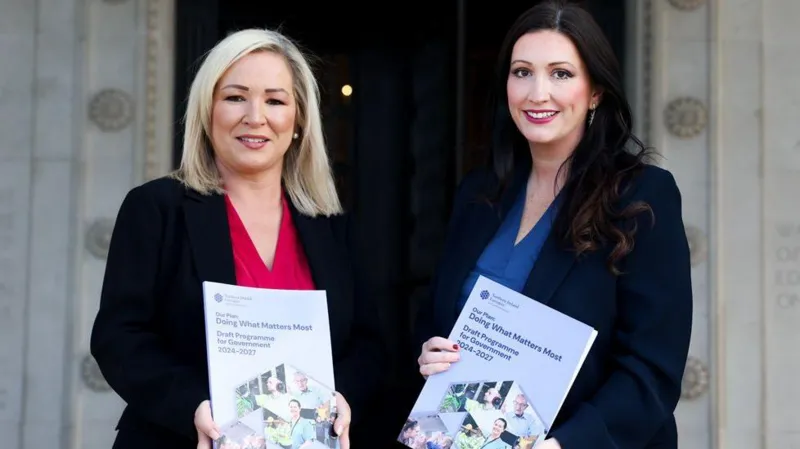People should consider energy bill fix, regulator says Kevin Peachey

People should consider energy bill fix, regulator says The regulator is urging households to think about a fixed pricing agreement for their energy bills before prices increase once more in April.
A household using a normal amount of gas and electricity will see an increase in their bill of £111 annually, or £9.25 per month, to £1,849 as a result of Ofgem’s 6.4% increase in the energy price cap.
22 million homes in England, Wales, and Scotland are impacted by the cap, which is established every three months and restricts the amount that suppliers can charge for each unit of energy.
Although experts believe that prices may decline in July, Ofgem stated that moving to a fixed tariff offered certainty over payments and might lower expenses.
Even though average incomes are rising, the hike in April will affect people’s wallets concurrently with increases in council and water taxes.
The latest increase in energy prices, which is the third consecutive increase in the quarterly cap and more than the 5% analysts had predicted, was attributed by the regulator to growing wholesale costs and inflation. People should consider energy bill fix, regulator says Kevin Peachey
Bills will fluctuate based on the amount of energy consumed, even if the price of each unit of gas and electricity is capped.
Ofgem uses the effect on the yearly bill of a home with average energy use to demonstrate the cap.

Standing charges,
Standing charges, which are set rates to connect to an electricity and gas supply and differ by location, are decreasing for electricity but increasing for gas once more. There will be an annual rise of up to £20 for certain customers in London and the North Wales and Mersey region.
Jonathan Brearley, the CEO of Ofgem, said that an additional rise in energy expenses was “unwelcome”.
According to him, consumers should endeavor to reduce expenses and “provide certainty over coming payments” by “switching or fixing tariffs now” if at all possible.
In recent months, almost four million households have made repairs, according to Ofgem.
Some customers who owe money to their supplier will not be allowed to change companies, but they should still be able to negotiate the best fixed price with their present supplier.
Mr. Brearley went on to say that anyone who is having trouble paying their bills should get in touch with their supplier.
It was “no-brainer” to switch to a fixed deal, according to Martin Lewis, founder of Money Saving Expert, who spoke to the BBC.
He advised consumers to wait a little time before selecting a new tariff because he has heard that some “good tariffs are being launched” by energy companies, and to look at whole-of-market comparison websites for the best offer.
Variable prices, however, may drop once more in July to approach the current level, according to researchers at the consultancy Cornwall Insight.

Parents at a Manchester
Parents at a Manchester mum and baby sensory session expressed that they were constantly concerned about growing expenditures.
The class was attended by Michelle Gill and her infant child, Ori. “We have definitely felt a difference in the quality of life we can afford now,” she added.
“Things we didn’t think about a year ago are now at the front of our mind.”
According to Melissa Rawling, the mother of Ezra, “we have to keep the heating on more but it’s not what we would like to be doing” now that they have a baby.
“In order to avoid having to keep the heating on, I’m more mindful about going outside during the day. Things like this class are perfect for staying warm because we can’t spend the entire day at the park when it’s chilly.”
Debt fears
Charities warned that billpayers would suffer greatly as a result of the price increase.
According to Citizens Advice’s analysis, 6.7 million people in England, Wales, and Scotland owed money to their energy provider. Nearly £4 billion is outstanding, according to official data.
“We’re helping people every day who simply can’t afford this latest price hike,” Dame Clare Moriarty, the organization’s chief executive, stated.
Next winter, the government plans to increase the number of individuals eligible for the Warm Home Discount program, which lowers the annual energy expenditure for some recipients of benefits by £150.
Although energy costs have increased by almost 50% since the start of the COVID-19 pandemic, they are still below the 2022 peak, when prices spiked due to Russia’s invasion of Ukraine.
International gas prices, which have increased “significantly” recently, are the primary cause of the most recent price increases, according to Tim Jarvis, director general of markets at Ofgem.
Energy prices, however, have decreased in recent weeks after US-Russian negotiations on a possible conclusion to the conflict in Ukraine, according to experts at Cornwall Insight.
Although it pointed out that this would still be hundreds of pounds over the pre-conflict level, the consultancy has predicted that the price cap will drop to £1,756 per year for the average consumer in July.
Additionally, it stated that the price cap projections “will change multiple times” prior to July due to the energy market’s volatility.
According to the most recent modifications, in April:
The average price of gas and electricity will be capped at 6.99p and 27.03p per kWh, respectively, up from 6.34p and 24.86p. An average household uses 11,500 kWh of gas and 2,700 kWh of electricity annually.
With an average yearly bill of £1,803, households with pre-payment meters pay somewhat less than those on direct debit.
With an average yearly bill of £1,969, those who pay their bills with cash or checks are paying more.
Energy Secretary Ed Miliband responded to the latest price increase by saying the government was determined to protect people by extending the Warm Home Discount and encouraging energy creation in the UK. Standing charges have decreased to 53.8p per day for electricity and increased to 32.67p per day for gas, depending on the region. The regulator has extended the Debt Allowance Scheme, which is a charge for all customers to cover the cost of that debt support, until something different is done to deal with the amount of debt being accrued.
The price increase was deemed “a betrayal to the families who Ed Miliband promised to save £300 on their bills” by acting shadow energy secretary Andrew Bowie.
Ed Davey, the leader of the Liberal Democrats, reiterated his call for the reduction in the number of seniors who are eligible for the Winter Fuel Payment to be reversed.
How to reduce energy consumption and expenses
Three suggestions from experts to monitor energy consumption during the warmer months are as follows:
Reduce the boiler’s temperature if the hot water is too hot to wash your hands in.
Reduce other drafts in the house or control your own by, for example, placing a black bag filled with crumpled paper up an unused chimney.
Don’t spend more than four minutes in the shower. To help you stay on time, the nonprofit organization WaterAid has put together a playlist of four-minute tunes.
Read more here if you are struggling to pay energy bills
to keep up with the major events, read the best political commentary, and acquire knowledge from all throughout the UK. Every daily, it will be sent directly to your mailbox .Sign up for our Politics Essential newsletter



